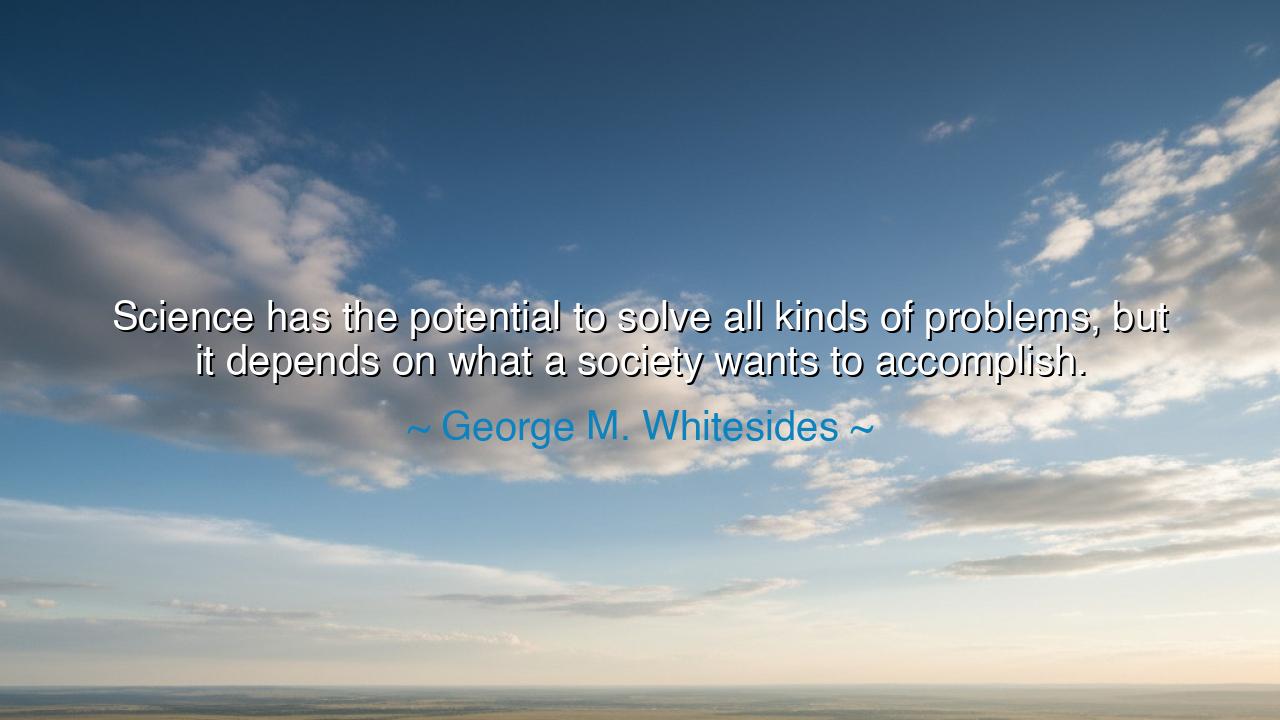
Science has the potential to solve all kinds of problems, but it
Science has the potential to solve all kinds of problems, but it depends on what a society wants to accomplish.






Hear this, O children of the earth, for the words of George M. Whitesides carry within them a deep and timeless truth. "Science has the potential to solve all kinds of problems, but it depends on what a society wants to accomplish." These words speak not only to the power of science but to the responsibility of society in determining how that power will be used. Science, with its boundless potential, is a tool—a mighty force capable of changing the world in ways both marvelous and terrible. But as with all great forces, its direction, its purpose, is determined by the hands that guide it. It is not the science itself, but the goals of the society that shape how that knowledge will be applied.
Consider, O children, the ancient world, where the wisdom of the great philosophers and scientists shaped early societies. In the time of Pythagoras and Aristotle, the pursuit of knowledge was a noble endeavor, but it was guided by the moral and philosophical ideals of those who sought to understand the world. Their discoveries—from the principles of geometry to the foundations of natural philosophy—were shaped by a vision of the world that sought to improve the human condition, to seek harmony and understanding in all things. But even in those days, the power of knowledge was not a force without consequence. Pythagoras's mathematical principles, for example, were applied not just to the study of nature, but to the very rhythms of life, from music to the cosmos, reflecting the belief that knowledge could bring balance to the world.
In more recent times, we have witnessed the immense power of science to both heal and to harm. The discovery of penicillin by Alexander Fleming, for instance, saved millions of lives and revolutionized medicine, demonstrating that science has the potential to solve some of humanity's greatest problems. Yet, in the very same century, the advent of nuclear technology—a product of scientific genius—brought both the promise of energy and the destruction of warfare. The power of science in the 20th century was undeniable, but its application was determined by the intentions of those who wielded it. Whitesides reminds us that while science holds the power to transform society, its use is ultimately guided by the values and goals of the people who seek to shape the world.
Consider, too, the journey of Albert Einstein, who, through his theory of relativity, unlocked the secrets of the universe, revealing the deep interconnectedness of space, time, and energy. Einstein, like Fleming, saw the power of science to bring about profound change. But as the atomic bomb was developed using his equations, he expressed regret for his role in creating a weapon that could destroy entire cities. Science, in the hands of those with destructive intent, can be as dangerous as it is powerful. Whitesides' words serve as a reminder that science itself is not an inherently good or bad force; it is the purpose for which it is used that determines its impact on the world.
And so, O children, science is not an isolated force that exists apart from us—it is a tool that we, as a society, wield. Whitesides's insight calls us to recognize the importance of intention in the pursuit of knowledge. What is the purpose behind our scientific endeavors? Are we using the power of science to build a better world, to heal the sick, to explore the unknown, to create peace? Or are we using it to control, to dominate, to destroy? The path of science is shaped not just by its discoveries, but by the values of the society that seeks to apply those discoveries. If we desire a world of justice, of compassion, of prosperity, then we must guide our scientific endeavors with those very principles.
The lesson for us, O children, is one of responsibility. We are not mere bystanders in the great unfolding of knowledge. We are the stewards of the power that science gives us. The challenges of the modern world—climate change, disease, poverty, and conflict—require not just knowledge, but wisdom in its application. We must ask ourselves: What kind of world do we wish to create? And how can we use the power of science to bring about that world? The path of science is open to us all, but it is up to us to ensure that it is used for the betterment of humanity and the world that sustains us.
So, O children, take up the mantle of knowledge with both reverence and courage. Recognize that science is a tool, and that it is your hands that will guide it. Let the goals of your society be guided by compassion, justice, and a desire to serve the greater good. Science is not just a means to an end; it is a reflection of who we are, of what we value, and of the kind of world we wish to create. Choose wisely, and let the power of science work for a future where all may thrive.






AAdministratorAdministrator
Welcome, honored guests. Please leave a comment, we will respond soon